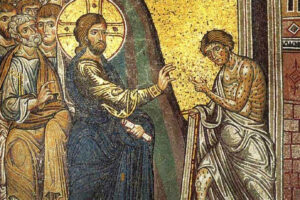Last edited on 15/Apr/2023
For a shorter article on the Holy Trinity, please see the below article:
The Bible’s Answer
One God, Three Persons
The Holy Trinity is the biblical, monotheistic doctrine that there is only one God in three distinct co-equal, co-eternal Persons: the Father, the Son (Jesus Christ), and the Holy Spirit; three Persons of the one nature and being. The Father is not the Son, the Son is not the Spirit, and the Spirit is not the Father, but each of them are fully, equally, and simultaneously God. These three Persons are not three gods, but one God—the only God in existence. There are three essential parts of the Holy Trinity:
- There is only one God.
- The Father, Son, and Holy Spirit are three different Persons.
- The Father, Son, and Holy Spirit are the same Being (God).
In summary, the Holy Trinity is: “one God in three Persons”. Person, in this context, is best described as someone who can say “I” and “You” and who possesses individuality and self-awareness. Being (or substance / essence) is best described as what you are, or everything that you consist of that that makes you what you are. Some Christians find it helpful to say that God is three “Who’s” (Persons) and one “What” (Being).
Nature, in this context, refers to the specific qualities and aspects of beings or things that make them of the same kind or of a different kind of other beings or things (e.g. human nature, angelic nature, and divine nature, the last of which refers to God). It should be noted that Christians sometimes use the term “Godhead” to refer to all Persons (or members) of the Holy Trinity. In addition, Christians often call the Father the First Person of the Trinity, the Son the Second, and the Holy Spirit the Third. Christians worship a three-in-one God.
Examples to Help Understand the Holy Trinity
The Holy Trinity is a very difficult concept to wrap our heads around. God is far greater than how we think of him, after all. However, there are some real-life objects or concepts which may help us come to terms with God’s Triune nature. One example is a three-leafed clover. There are three leafs on the one plant, similar to the three Persons in the one God. Another example is matter. Matter consists of solids, liquids, and gases, but there is only one matter, not three. Another example is an apple: it has the skin, flesh, and seeds, yet these are not three apples, but one apple.
These examples are not perfect, though, and should not be used as accurate descriptions of God’s Triune nature. God is both known by those who love him (Galatians 4:9) and at the same time he is a mystery whom the human mind can never comprehend (Romans 11:33–35). This makes sense, to a certain degree; after all, one should be suspicious of any claims that the finite human mind can contain and understand the infinite and transcendent God (Isaiah 40:28; Jeremiah 23:24). One of the most helpful (but still imperfect) illustrations of the Holy Trinity would have to be the Shield of the Trinity.
The Holy Trinity Is a Standard of Orthodoxy
Because the Holy Trinity deals with the nature and identity of the God of the Bible, the Christian church in all its denominations across all centuries has rightly labelled those who reject this doctrine as non-Christian and heretical. If you do not see God in a Trinitarian way, then you do not know God at all, because the God of the Bible has revealed himself as the Father, Son, and Holy Spirit. The Holy Trinity is an essential doctrine of the Bible; you must believe in it in order to be a Christian.
The Bible Teaches the Holy Trinity
The Bible never mentions the word “Trinity”. It also does not use phrases like: “God is three-in-one”, “one God in three Persons”, or “three Persons of the one substance / essence / being.” However, the Bible does teach things that force us to think of God in a Trinitarian way if we are to be faithful to the biblical text.
- The Bible teaches that there is only one God. Yahweh said: “Before me no god was formed, nor shall there be any after me.” (Isaiah 43:10b, ESVUK) (See also Isaiah 45:5)
- The Bible calls the Father God. Paul wrote: “Grace to you and peace from God our Father and the Lord Jesus Christ.” (1 Corinthians 1:3) (See also Colossians 1:2)
- The Bible calls the Lord Jesus Christ God. John wrote: “In the beginning was the Word, and the Word was with God, and the Word was God. … And the Word became flesh and dwelt among us …” (John 1:1, 14) (See also John 20:28–29)
- The Bible calls the Holy Spirit God. Luke wrote in Acts: “But Peter said, “Ananias, why has Satan filled your heart to lie to the Holy Spirit … You have not lied to men but to God.” (Acts 5:3–4) (See also 1 Corinthians 3:16–17)
- The Bible teaches that the Father, Son, and Holy Spirit are different Persons: “… when Jesus also had been baptized and was praying, the heavens were opened, and the Holy Spirit descended on him in bodily form, like a dove; and a voice came from heaven, “You are my beloved Son; with you I am well pleased.” (Luke 3:21–22) (See also John 14:16–17)
We cannot deny the passages which say there is only one God, or which call each Person of the Trinity God, or which show each Person of the Trinity interacting with one another. In this way, the Bible forces us to see God as one God who has revealed himself as three Persons. Any other opinion or attempt to explain away the clear and plain words of these passages is not derived from the Scriptures but is in fact from Satan himself, who leads people astray from a true knowledge of God (John 8:44; 2 Corinthians 11:14–15).
Attributes of the Persons of the Holy Trinity
Some more Bible passages which force us to view God in a Trinitarian way are the ones which give each Person of the Trinity divine attributes that are exclusive to God alone, proving that they are co-equal and co-eternal. For example:
- The Father is all-powerful (Job 42:2), all-knowing (Psalm 94:9–11), all-present (Ephesians 4:6), the Creator (Isaiah 64:8), giver of salvation (John 5:21), and eternal (Psalm 90:2).
- The Son is all-powerful (Philippians 3:20–21), all-knowing (John 21:17), all-present (Matthew 28:20), the Creator (Colossians 1:16), giver of salvation (John 5:21), and eternal (Micah 5:1–2).
- The Holy Spirit is all-powerful (Luke 1:35), all-knowing (1 Corinthians 2:10–12), all-present (Psalm 139:7–8), the Creator (Job 33:4), giver of salvation (John 3:6), and eternal (Hebrews 9:14).
When we compare passages like these with those which call the Father, Son, and Holy Spirit God, we cannot deny that the three Persons are equally divine without denying the Scripture’s clear testimony.
Roles of the Persons in the Holy Trinity
The Father elects Christians to salvation (Ephesians 1:3–4), sent the Son into the world to be its Saviour (John 3:16–17) and the Holy Spirit to convert his elect (John 15:26), and draws people to his Son (John 6:44). The Son redeemed his people by his death on the cross (Titus 2:13–14), acts as the mediator between us and God as our high priest (Hebrews 4:15; 7:25), reveals the Father to us (Matthew 11:27), and sent the Holy Spirit into the world (John 15:26). The Holy Spirit acts as our teacher in the faith (1 Corinthians 2:10–12), bears witness to Jesus (John 15:26), sanctifies us (2 Peter 1:2), and seals and protects us in the faith (Ephesians 1:13–14).
In the beginning, the Father, Son, and Holy Spirit were together, and were each involved in creating the world (Genesis 1:1–2; John 1:1–3). In Jesus’ life on earth, the Father and the Son worked together in unison (John 5:17–19) and the Son was empowered by the Holy Spirit (Isaiah 61:1–3; Matthew 12:28). The Father was in Christ reconciling the world to himself (2 Corinthians 5:18–19) and the Son offered himself to the Father through the Holy Spirit for our salvation (Hebrews 9:14).
Today, when Christians believe in Christ, the Father and the Son make their home with them (John 14:23) and the Holy Spirit makes them his temple in which he dwells (1 Corinthians 6:19). When we look at how these roles are each closely connected, and are used for the common purpose of our salvation, we see the order and harmony between the Persons of the Trinity.
The Persons in the Holy Trinity Are Grouped Together in Significant Ways
As three Persons of the one being, the Father, Son, and Holy Spirit share a remarkable connection with one another. For example, Jesus commanded baptism to be done in the name of the Father, Son, and Holy Spirit (Matthew 28:19). Here we see that each member of the Trinity shares the same name, that they are placed on an equal level with one another, and that through baptism Christians belong to each of them. In an amazing passage which speaks of the saving work of God, Paul wrote:
But when the goodness and loving kindness of God our Saviour appeared, he saved us, not because of works done by us in righteousness, but according to his own mercy, by the washing of regeneration and renewal of the Holy Spirit, whom he poured out on us richly through Jesus Christ our Saviour, … (Titus 3:4–6)
Here we see that God the Father, God the Son, and God the Holy Spirit is Saviour. The work of salvation is the Triune God’s. When describing the Christian faith that we must hold to, Paul wrote that there is one body (church) and Spirit, one Lord (Jesus), faith, and baptism, and one God and Father of all (Ephesians 4:4–6). Here we see that each member of the Trinity is of equal importance in the Christian faith (note that the Holy Spirit is mentioned first this time). In another passage, Paul ends his letter with a Trinitarian blessing, this time mentioning Jesus first:
The grace of the Lord Jesus Christ and the love of God and the fellowship of the Holy Spirit be with you all. (1 Corinthians 13:14)
God’s full blessings are Trinitarian in nature, in which the Father, Son, and Holy Spirit each bless us with their unique gifts (grace, love, fellowship).
Submission in the Holy Trinity
Finally, it’s apparent that there is a certain level of submission within the Trinity, based on a hierarchy of function, not ontology (essence). The Son freely and willingly submits himself to the Father and the Holy Spirit freely and willingly submits himself to both the Father and the Son. We see this in the fact that the Father sends the Son and the Father and the Son send the Holy Spirit, among other similar reasons.
However, the fact that the Son and the Spirit submit themselves to the Father does not imply that they are less divine than the Father. It simply means that God is a God of order (1 Corinthians 14:33, 40) as well as a community of love (1 John 4:16). The Son and Spirit are equal with the Father in nature, essence (being), power, rank, and authority, as shown in the above sections, and are, therefore, not inferior to the Father in any way.
The Trinitarian relationship of the Father taking the lead in love while the Son and Spirit respond in love by humbly and gladly following his commands gives us a great example of what human relationships should look like. In the same way that each member of the Trinity is equal in essence despite there being a hierarchy, each human being is also equal with one another in essence, no matter what role or position we hold.
Conclusion
The doctrine of the Holy Trinity teaches that there is only one God in all existence who has revealed himself as three distinct Persons: the Father, Son, and Holy Spirit; three Persons of the one nature and being. These three Persons are co-equal and co-eternal.
The biblical foundations of the Trinity are that the Bible teaches there is only one God, calls the Father, Son, and Holy Spirit God, teaches that they are three distinct Persons, and teaches that these three Persons share significant divine attributes. We also see from the Bible that they work together perfectly, are grouped together and given equal importance in key passages, as well as put on an equal level with one another. All this forces us to view God in a Trinitarian way. While there is subordination within the Trinity, this is simply because God is a God of order and a community of love, and does not make the Son or the Spirit less divine than the Father.
Some non-Christian cults deny the Holy Trinity because they don’t like the fact that it’s complex; they want a god who is simple enough for their minds to comprehend. In doing so, they have forsaken biblical teachings and created an idol of their liking in their minds which they worship instead of the true God. We can’t understand everything about God, but we can still know him personally for salvation, and everything that we need to know about him has been revealed in the Bible. The Holy Trinity is a biblical teaching that is essential to the Christian faith; we must believe in it in order to truly know God and have eternal life (John 17:3).





